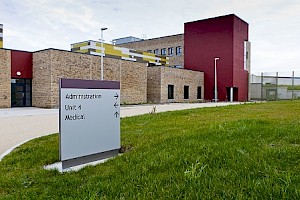Youth Justice
Ireland has a long history of poor responses to offending behaviour by children. A core strand to IPRT's work since its establishment in 1994 has been the promotion of a more effective youth justice system, with emphasis on non-custodial alternatives, diversion, early intervention and prevention strategies and programmes. Central to our work was ending the practice of detaining children in adult prisons, which was in breach of international human rights standards and a serious stain on Ireland's human rights record.
International human rights standards, and in particular the provisions of the UN Convention on the Rights of the Child, are clear that custody for children should only be used as a last resort and for the minimum required period of time. All efforts should be made to apply alternatives to detention to ensure that such a measure is only used in exceptional circumstances.
In Ireland, the Children Act 2001 recognizes the principle of detention as a last resort. The Act prohibits the imprisonment of children and the Criminal Justice Act 2006 makes provision for all children less than 18 years of age to be detained in Children Detention Schools. The detention school model is focused on a model of care, education, health and programmes that address offending, with improved outcomes for the young people, their communities and all of society. The Irish Youth Justice Service is responsible for the Children Detention Schools, within the Department of Children and Youth Affairs.
Following years of sustained advocacy by IPRT, along with many national and international bodies, in 2012 the detention of boys aged under 17 at St Patrick's Institution ended. In March 2017, a Ministerial Order ended the sentencing of children aged under 18 to adult prison in Ireland, and in April 2017, St. Patrick’s Institution was finally closed. Since September 2017 boys aged under 18 are no longer detained in the adult prison system.
IPRT continues to work towards progressive change in youth justice policies and practice, as well as engaging with wider policy and practice issues relating to youth justice, such as the provision of alternatives to detention, diversion and early intervention programmes.

The Cost of Youth Crime
2nd December 2010
A report issued today by the Prince's Trust entitled "The cost of exclusion: cutting the cost of youth disadvantage in the UK" has found that the price of crime committed by those aged 21 years or under in Great Britain has risen to a staggering £1.2 billion a year, equating to over £23 million a week.
Eng & Wales: Supporting vulnerable children in the youth justice system.
24th November 2010
A review of the youth criminal justice system in England and Wales carried out by the Prison Reform Trust, Seen and heard: supporting vulnerable children in the youth justice system, has provided lessons that other States, including Ireland, should take great heed of.
UK: Children and Young People in Custody 2009-10
18th November 2010
HM Inspectorate of Prisons and the Youth Justice Board have published a new report detailing the experiences of children and young people in prison custody.
Youth Violence and Effective Interventions
4th November 2010
A review titled 'Youth Violence in Scotland: Literature Review', commissioned by the Scottish Government, has just been published. It aimed to identify and collate available qualitative and quantitative research data and information about youth violence in Scotland and determine key findings in relation to effective youth interventions to reduce such behaviour.
Punishing Disadvantage: a profile of children in custody
14th September 2010
A new report from the Prison Reform Trust and the Institute for Criminal Policy Research provides compelling evidence for the existence of pathways from disadvantage to the prison.
UK: From Playground to Prison: The Case for Reviewing the Age of Criminal Responsibility
13th September 2010
According to a new report released by children's charity Barnardos, the age of criminal responsibility should be lifted from ten to twelve in England and Wales. This would bring it into line with other countries, including Ireland.
UK: A Joint Inspection of Youth Crime Prevention (report)
9th September 2010
HMI Constabulary, HMI Probation, Care Quality Commission and Healthcare Inspectorate Wales have produced a report entitled 'A Joint Inspection of Youth Crime Prevention'. The report reveals a number of positive findings but also emphasises that the work to turn children away from crime needs to be more focused.
Guardian: Government climbdown on detention of children in immigration centres
9th September 2010
UK Immigration minister Damian Green announces intention to 'minimise' detention of children rather than end practice.
Collaboration with Courts: Reducing Imprisonment Rates for Young People
7th September 2010
Children and Young People Now reports on some youth justice schemes in England which are successfully reducing the number of young people imprisoned.
Garda Diversion Programme Report 2009
19th August 2010
The Annual Report of the Committee Appointed to Monitor the Effectiveness of the Diversion Programme has been published. The Diversion Programme is a scheme for dealing with young people who commit offences.




